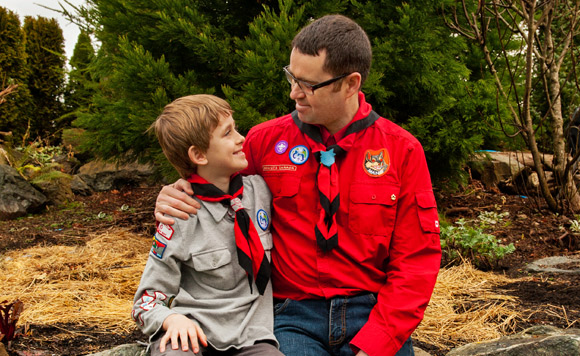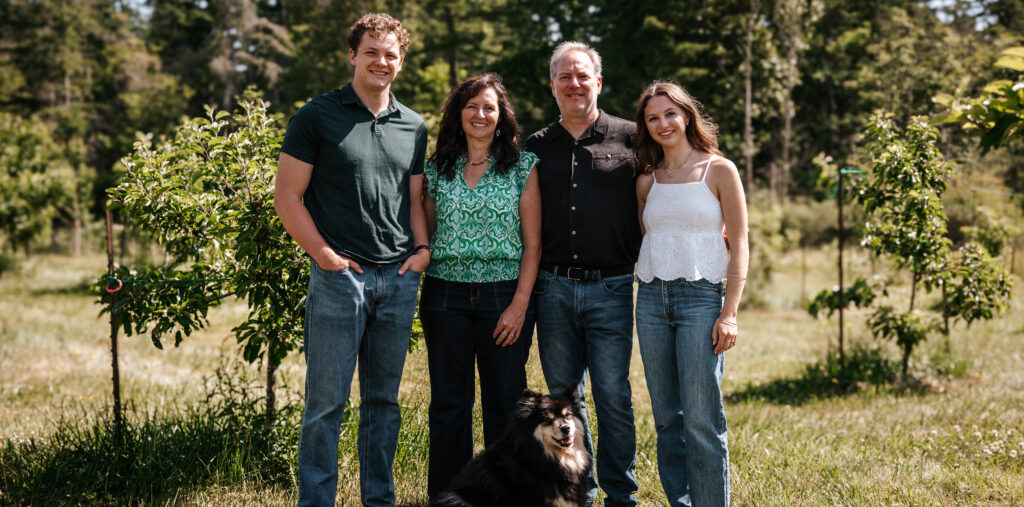– by Janice Henshaw –
Your heart, beating away – counted upon, mostly ignored, often short on maintenance – until one day, it falters, and your whole life changes in an instant. For Kerry Broome, who loved his job as Manager of Program Services at Panorama Recreation Centre, this change came when he was 42 years old, attending Beaver Camp with his seven-year-old son.
Kerry’s leadership name was Bubbles, but on that late spring weekend in 2012, he didn’t live up to the name. Over the course of the campout he experienced growing chest discomfort. Normally an active, outgoing athlete, the thought of hiking was suddenly too much. Bending over to enter his tent was a grueling experience.
On arriving home, feeling much worse, Kerry went to the hospital. An electrocardiogram revealed a possible enlarged ventricle. The doctor was worried; he told Kerry “I don’t like this.”
Kerry was born with a congenital heart defect involving the aortic valve: “a condition in which the valve between the main pumping chamber of your heart (left ventricle) and the main artery to your body (aorta) doesn’t work properly.” (www.mayoclinic.org). In Kerry’s case, as the disease progressed, blood flowed back into his heart with every beat. It was this pressure that caused the left side of his heart to enlarge. When he was twelve years old, a doctor had told him that one day in the future, perhaps when he was fifty or sixty, he would require aortic valve replacement surgery.
On June 14, Kerry underwent a seven hour open heart surgery to replace the faulty valve. In addition the aortic root and ascending aorta had to be replaced. Following the surgery he dealt with fluid in his lungs and the accompanying effort in breathing, pain, fatigue and constant discomfort. Kerry quickly learned that to keep the pain manageable, he had to be honest and assertive with his health care providers.
Due to the mechanical heart valve he had fitted, Kerry now has to take warfarin, an anticoagulant medication used to slow down the clotting process. A complication of this drug is the risk of bleeding, most seriously in the brain or the gastrointestinal tract. Weekly blood tests show how effectively his blood is clotting. He also has to be extremely careful about how much he eats of leafy green vegetables and other foods that contain Vitamin K because it affects Warfarin’s slowing down of the blood’s clotting ability. If the blood is too thin, then it can cause bleeds, and if the blood is too thick, it can cause a clot. Kerry points out that “everything downstream of a clot will die.”
By September 2012, Kerry was back to work, doing light exercise, and volunteering with the Beavers. 2013 he said passed by in a blur. But he was not feeling great; he was suffering from anxiety and feeling depressed.
While working on his computer last April, Kerry noticed some dexterity loss in his left hand. Later he developed what he thought was the beginning of a migraine headache, experiencing visual auras and disturbances. However, it was not a migraine; Kerry was having a cerebral vascular accident (CVA), a stroke.
Kerry’s hemorrhagic stroke was the result of a lesion in the parietal lobe which lies behind the frontal lobe. “This part of the brain houses sensory activities, such as receiving and interpreting information from all parts of the body, including where your body is positioned in physical space. A stroke affecting the parietal lobe in the right hemisphere can cause agnosia, which means you can feel, see and hear, but may not be able to understand what you are perceiving. In other cases, a condition called neglect may develop, which means you may lack awareness of one side of your body.” (www.heartandstroke.com)
“That’s when the fun really started” Kerry said. “Heart surgery was a cakewalk compared to the stroke. It was a huge stress on everyone in my family, and for me. Things got increasingly difficult, and went from bad to worse.”
After a lengthy stay in the Victoria General Hospital Intensive Care Unit in Victoria, Kerry was transferred to the Fifth Floor Rehabilitation Unit. He had to learn how to walk again. But while he was experiencing his own difficulties he was touched by the incredible compassion that he saw in the family and friends who came in daily to care for their loved ones.
On May 2, 2014, Kerry was released from hospital. “My depression did not improve; it was a real struggle. At first, all I wanted to do was lay in bed. Every day I live with the fear that I will have another stroke, one that will leave me severely disabled.” Kerry is not alone. Research published by the Heart and Stroke Foundation indicates that “Clinical depression is a medical illness and affects 10-15 percent of the population and 33-50 percent of stroke survivors.”
“What do you have to look forward to when every day is a struggle, when you can’t see past tomorrow?” Kerry asked. “Much of the fun in recreation, and life, is anticipation of what you are going to do,” explains Kerry, “and whether that’s camping, going to Disneyland, or whatever, it makes you feel good. But when you are depressed, all that goes out the window, all that serotonin just dries up.” Kerry made the decision to start taking anti-depression medication. He is also finding it helpful to explore cognitive behavior therapy.
A strong network of friends and family has stood by Kerry over the past two years. “They have been really supportive and that part has been great. But it’s also been tough because they want to see me better, they want to see improvement, and I just can’t be the same person I was before all this happened.”
Kerry is keen to publicly thank all the staff at Victoria General Hospital for their expertise and care. He is also grateful to staff at the Panorama Recreation Centre who have supported him so compassionately through his long ordeal, and he especially appreciated the hospital visits. Kerry’s boss, Ian Hennigar, Senior Manager at Panorama, visited him every week. “Kerry is an amazing young man,” said Ian, “and he’s had a really rough go. He’s always been dedicated to his family and Panorama. Kerry’s one of the most creative managers that I have ever had the opportunity to work with.”
Many studies indicate that after a stroke it often takes at least two years to approach anything feeling normal. Kerry has recently been cleared to drive again, which has helped restore his independence. At the suggestion of his sister-in-law Kedsanee, who is a clinical counsellor, Kerry has begun practicing meditation to deal with anxiety. “I am practicing every night. It feels good to slow my breathing down and it sort of grounds me. I think it’s definitely beneficial.” Kerry has also found comfort in Harold Kushner’s classic book When Bad Things Happen to Good People and Marshall Rosenberg’s teachings in compassionate communication.
“Watching my son doing stuff, playing with a big bag of Lego Bionicles and finding new ways to be creative and having a good time experimenting and investigating life – that’s what I like doing best. The other day, my younger brother Sean came over and he didn’t say anything, he just put his arms around me and comforted me with a hug when I was feeling particularly low.” It was a good moment for me.
As a long term participant at Panorama Rec Centre, I had often seen Kerry at work. I remember thinking at the time – wow, there’s a handsome young man with a great job. How lucky he must be! So I was really struck with sadness when I heard about his health battles. But as our interview progressed, I realized how courageous he is, and I couldn’t help but wonder if I could have faced what he has gone through. I really don’t know. I was reminded of Eleanor Roosevelt’s words:
You gain strength, courage, and confidence by every experience in which you really stop to look fear in the face. You are able to say to yourself, “I lived through this horror. I can take the next thing that comes along.” … You must do the thing you think you cannot do.




